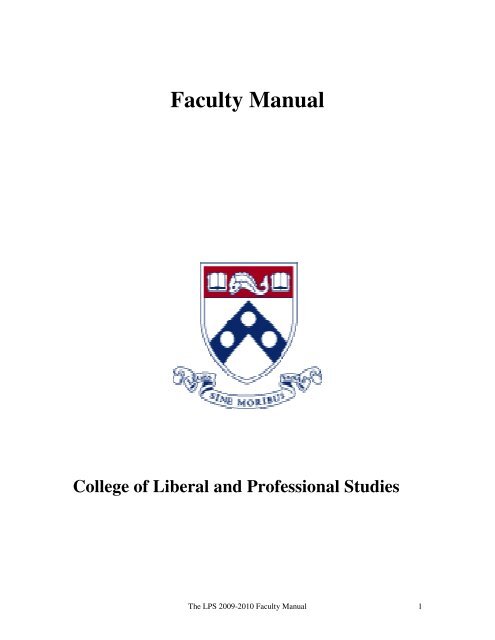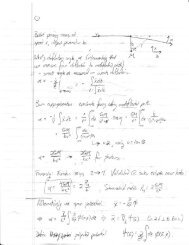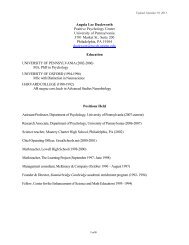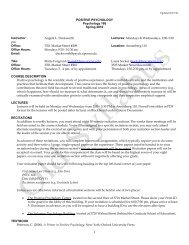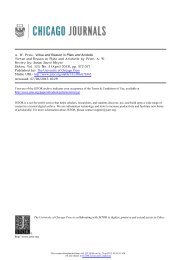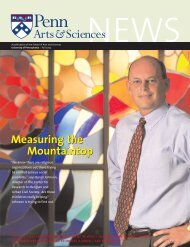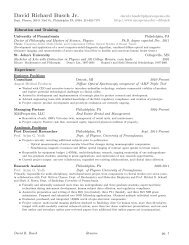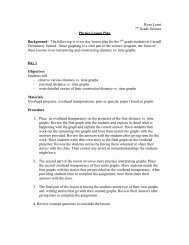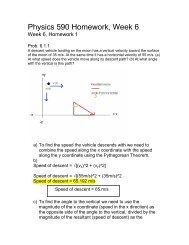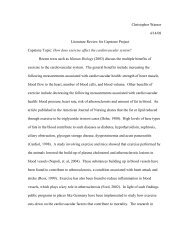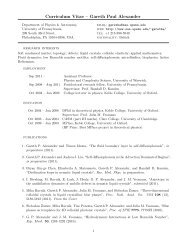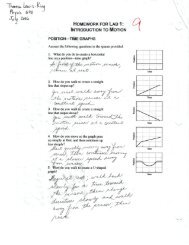Faculty Manual - Bad Request - University of Pennsylvania
Faculty Manual - Bad Request - University of Pennsylvania
Faculty Manual - Bad Request - University of Pennsylvania
You also want an ePaper? Increase the reach of your titles
YUMPU automatically turns print PDFs into web optimized ePapers that Google loves.
<strong>Faculty</strong> <strong>Manual</strong><br />
College <strong>of</strong> Liberal and Pr<strong>of</strong>essional Studies<br />
The LPS 2009-2010 <strong>Faculty</strong> <strong>Manual</strong> 1
2008-2009 <strong>Faculty</strong> <strong>Manual</strong> College <strong>of</strong> Liberal and Pr<strong>of</strong>essional Studies<br />
2
I. Introduction<br />
Table <strong>of</strong> Contents<br />
1. Teaching at LPS<br />
2. Getting Started<br />
1) Getting on payroll<br />
2) Documents to be submitted to LPS<br />
3) Penn ID, email and PennCard<br />
4) How to establish a Blackboard site for your course<br />
5) Policies on photocopying<br />
6) Office hours<br />
7) Mailboxes<br />
8) Ordering books<br />
9) Reserve readings<br />
10) Ordering bulkpacks<br />
II. Academic Calendar<br />
III. Course Management<br />
1. Course Enrollment Information<br />
1) General rules<br />
2) LPS policies about matriculation, student registration, and permits<br />
3) Courses in Touch & IRQDB – Class list, online grading<br />
4) Late admission<br />
5) Exclusion <strong>of</strong> a student<br />
6) LPS policies on auditing<br />
7) Independent Study courses<br />
8) High school students at LPS<br />
9) Senior Associates<br />
2. Class Meeting Times and Room Information<br />
1) General rules<br />
2) Class times<br />
3) Classroom location and requests for changes<br />
4) Dropping/Withdrawing from a course after classes begin<br />
5) Canceling a class meeting<br />
6) Weather conditions<br />
3. Attendance, Grading and Final Examinations<br />
1) Attendance<br />
2) General rules<br />
3) Plus/Minus grading<br />
4) Pass/Fail option<br />
5) Incomplete<br />
6) Petition procedures<br />
7) Changing the grade or credit status <strong>of</strong> a course<br />
8) Academic grievances<br />
9) Academic integrity<br />
2008-2009 <strong>Faculty</strong> <strong>Manual</strong> College <strong>of</strong> Liberal and Pr<strong>of</strong>essional Studies<br />
3
4. Course evaluations<br />
IV. Teaching Resources<br />
1. Special Arrangements for LPS Classes<br />
1) Teaching aids – AV, films<br />
2) Guest lecturers<br />
3) Graders<br />
4) Other instructional activities<br />
5) Parties<br />
2. Academic Support services through Penn<br />
1) Libraries and the Information Commons<br />
2) The Weingarten Learning Resources Center<br />
3) Department <strong>of</strong> Academic Support Programs<br />
4) Computing at Penn<br />
5) Blackboard<br />
6) Communication Within the Curriculum (CWiC)<br />
7) Center for Programs in Contemporary Writing (CPCW)<br />
8) Center for Teaching and Learning (CTL)<br />
9) The Tutoring Center<br />
10) The Language Resource Center<br />
11) Multimedia & Educational Technology Services (MMETS)<br />
3. Safety around the campus<br />
1) Emergency phone numbers<br />
2) Student Health Services<br />
3) Student Intervention Services<br />
4) Counseling & Psychological Services for Students (CAPS)<br />
5) Helping students in distress<br />
6) Personal safety information<br />
4. <strong>University</strong> Policies and Procedures<br />
1) The PennBook<br />
2) Sexual Harassment Policy<br />
3) Vice Provost for <strong>University</strong> Life<br />
4) Confidentiality <strong>of</strong> Student Records<br />
5) Non-Discrimination Policy Statement<br />
V. Instructor Payment Information<br />
1. Compensation for Academic Year 2008-2009<br />
1) Compensation for regular undergraduate courses<br />
2) Compensation for specially designed LPS graduate courses<br />
2. Minimum Class size<br />
3. Payment Dates and Arrangements<br />
1) Payment dates<br />
2) Payment arrangement<br />
VI. LPS Contact List<br />
1. Contact numbers<br />
2. Resourceful webstie<br />
2008-2009 <strong>Faculty</strong> <strong>Manual</strong> College <strong>of</strong> Liberal and Pr<strong>of</strong>essional Studies<br />
4
Introduction<br />
1. Teaching at LPS<br />
Welcome to the College <strong>of</strong> Liberal and Pr<strong>of</strong>essional Studies (LPS). By deciding to teach in LPS,<br />
you have joined a superb faculty who, with dedicated staff, seek to meet the educational needs <strong>of</strong><br />
our students. Whether they are undergraduate or graduate students, degree candidates or nondegree<br />
students, LPS students share with other members <strong>of</strong> the Penn community academic<br />
excellence, intellectual curiosity, and a love <strong>of</strong> learning. Unlike many Penn students, however,<br />
LPS students <strong>of</strong>ten must balance their education with demanding careers and family<br />
responsibilities. Besides providing challenging educational opportunities for LPS students, LPS<br />
classes also serve students from other parts <strong>of</strong> Penn, including the College <strong>of</strong> Arts and Sciences<br />
and Graduate Arts and Sciences. LPS is committed to providing support to both faculty and<br />
students to assure that our students have a challenging and stimulating experience in the<br />
classroom, and that our faculty find their teaching in LPS pr<strong>of</strong>essionally rewarding<br />
In this handbook, we will introduce you to our programs and our students, describe our policies<br />
and procedures, and inform you about resources available to support LPS faculty and students. If<br />
you find, however, that you have questions that are not addressed or seek guidance on specific<br />
issues or particular students, we are always available to discuss them with you. You will find a<br />
list <strong>of</strong> LPS staff, with phone numbers and email addresses, at the back <strong>of</strong> this manual.<br />
2. Getting Started<br />
New <strong>Faculty</strong> may also find a condensed version <strong>of</strong> those actions needed to be taken<br />
upon hiring here: http://www.sas.upenn.edu/lps/faculty/information<br />
1) Getting on payroll<br />
Getting on payroll is the first step in your receiving a Penn Card, a PennKey, and a Penn email<br />
account. All these are required in order for you to use other teaching resources at Penn, including<br />
Blackboard.<br />
If your home department is other than LPS, you can contact your home department’s Business<br />
Office for them to put you on payroll. If your home department is LPS, you can contact Patricia<br />
Bittner at (215) 898-4363 or bittnerp@sas.upenn.edu.<br />
The documents that you will need to take to the business <strong>of</strong>fice are generally a copy <strong>of</strong> HR<br />
application form, copy <strong>of</strong> your appointment letter, an Employee Information Form, Form I-9,<br />
FormW-4, and application for direct deposit (if you wish). These forms can be found at<br />
http://www.finance.upenn.edu/comptroller/forms/.<br />
2) Documents to be submitted to LPS<br />
At LPS, we maintain electronic files for each course we <strong>of</strong>fer. For this reason, we ask each<br />
instructor to send us via email their course syllabus with their course description included, as well<br />
as an up-to-date copy <strong>of</strong> their CV. These materials should be sent to Joe Hallman<br />
(halljo@sas.upenn.edu) at your earliest convenience. In the upcoming academic year, if there are<br />
any changes in your CV, please notify LPS.<br />
2008-2009 <strong>Faculty</strong> <strong>Manual</strong> College <strong>of</strong> Liberal and Pr<strong>of</strong>essional Studies<br />
5
3) PennKey, ID, and Card<br />
i) Obtaining Your PennKey<br />
All LPS instructors are required to obtain a PennKey. A PennKey is required to<br />
authenticate, or verify, an individual's identity and to access many <strong>of</strong> Penn's networked<br />
computer systems and services. Authorized users need a PennKey and password to access<br />
such resources as Courses In Touch, Blackboard, certain library resources, and public<br />
campus computers. A PennKey is also required to obtain a Penn email account. Because<br />
much <strong>of</strong> what you do at Penn will require a PennKey password, you should select and<br />
register your PennKey as soon as possible after being put on payroll. The following web<br />
site provides more information about PennKeys:<br />
http://www.upenn.edu/computing/pennkey/.<br />
ii) Establishing your email account<br />
We require our instructors to have a Penn email address to communicate with Penn<br />
students, faculty, and staff. In addition, LPS and other Penn <strong>of</strong>fices will use your Penn<br />
email address to send you important information. To establish an email account, you first<br />
must have a PennKey and PennKey password. If your home department is in the School<br />
<strong>of</strong> Arts and Sciences, you can create your email account through SAS Computing at<br />
http://www.sas.upenn.edu/computing/help/Email/. If your home department is outside<br />
SAS, please contact your home department for instructions to create your email account.<br />
iii) Submitting information for the On-Line Directory<br />
We require our instructors to list their Penn contact information in the Penn On-Line<br />
Directory so that others can contact you as soon as you arrive on campus. The website for<br />
updating the directory is https://medley.isc-seo.upenn.edu/penn_portal/u@penn.php.<br />
You will need a PennKey to access the directory.<br />
iv) Obtaining your PennCard<br />
All LPS instructors are required to obtain a PennCard, the <strong>of</strong>ficial <strong>University</strong> <strong>of</strong><br />
<strong>Pennsylvania</strong> identification for students, faculty, and staff. The PennCard provides access<br />
to <strong>University</strong> facilities and services including the library. To obtain a PennCard, bring a<br />
valid form <strong>of</strong> photo ID (driver's license, passport, etc.) to the PennCard Center, 150<br />
Franklin Building, 3451 Walnut Street. Only instructors currently on payroll may receive<br />
a PennCard, which should be carried at all times. The PennCard web site is<br />
http://www.upenn.edu/penncard/card/about.html.<br />
4) How to establish a Blackboard site for your course<br />
The simplest and quickest way to have a Blackboard site set up for your course is to use the<br />
online request form, located at http://www.library.upenn.edu/forms/courseware/bbrequest.html.<br />
Instructors, or those acting on behalf <strong>of</strong> instructors, may use this form. After you submit your<br />
request, your course(s) will typically be available within one to two days. Students enrolled in<br />
your course will be given access to the Blackboard site automatically, usually within 24 hours <strong>of</strong><br />
the site's creation, as long as they have a Penn email address.<br />
5) Policies on photocopying<br />
LPS instructors should contact their home department to have copies <strong>of</strong> syllabi, student<br />
assignments, and exams made for their courses. Most departments limit the amount <strong>of</strong><br />
photocopying each instructor can do within the department. Please note that some departments<br />
have eliminated photocopying or restricted it severely in light <strong>of</strong> budget constraints. If you have<br />
course readings and other substantial documents to copy, you should arrange with Campus Copy<br />
2008-2009 <strong>Faculty</strong> <strong>Manual</strong> College <strong>of</strong> Liberal and Pr<strong>of</strong>essional Studies<br />
6
Center or Wharton Reprographics to make a bulkpack available for your students to purchase, or<br />
you should work with Electronic Reserve in Van Pelt library to have the readings scanned in for<br />
your students to access through Blackboard. LPS will not photocopy course materials for<br />
instructors, nor will we reimburse instructors for photocopying at a copy center.<br />
Campus Copy Center: 3907 Walnut Street<br />
Phone: 215.386.6410<br />
Fax: 215.386.6268<br />
http://www.campuscopycenter.com/<br />
Wharton Reprographics: 400 Steinberg Hall-Dietrich Hall, 3620 Locust Walk<br />
Phone: 215.898.7600<br />
Fax: 215.898.2400<br />
http://reprographics.wharton.upenn.edu/<br />
Electronic reserve<br />
http://www.library.upenn.edu/reserves/eres-submissions.html<br />
6) Office hours<br />
LPS instructors are required to schedule <strong>of</strong>fice hours for students who may require assistance<br />
outside the classroom. Office hours are particularly important for students in courses requiring<br />
quantitative analysis, synthesis, intensive writing, research, or project development. Most<br />
instructors poll their classes on the first day to determine the most convenient day/ time for the<br />
most people, as well as <strong>of</strong>fering <strong>of</strong>fice hours by appointment.<br />
Instructors should check with their home department to see whether there is any available space<br />
to use for <strong>of</strong>fice hours. Another way to find an available space is to request space from the<br />
Registrar’s <strong>of</strong>fice after the first full week <strong>of</strong> classes each semester. For example, for Fall 2009,<br />
you can make a request beginning Monday, September 14 th by visiting the Classroom Technology<br />
Services website at http://www.isc-cts.upenn.edu/finder/ and filling out the Academic Event<br />
request form.<br />
7) Mailboxes<br />
You will have your mailbox in your home department. Please check with your home department<br />
regarding departmental hours and the location <strong>of</strong> the mailbox.<br />
8) Ordering books<br />
There are three bookstores on or near campus used by Penn faculty to order course books.<br />
i) Penn Bookstore: The <strong>of</strong>ficial bookstore <strong>of</strong> the <strong>University</strong> <strong>of</strong> <strong>Pennsylvania</strong>, run by Barnes<br />
and Noble.<br />
Phone: 215.898.7595<br />
Email: coursebk@pobox.upenn.edu<br />
http://upenn.bkstore.com/<br />
ii) Penn Book Center: An independent academic bookstore serving the university<br />
community.<br />
Phone: 215.222.7600<br />
Email: info@pennbookcenter.com<br />
http://www.pennbookcenter.com<br />
2008-2009 <strong>Faculty</strong> <strong>Manual</strong> College <strong>of</strong> Liberal and Pr<strong>of</strong>essional Studies<br />
7
iii) House <strong>of</strong> Our Own: An independent academic bookstore serving the university<br />
community.<br />
Phone: 215.222.1576<br />
Email: hooo@bellatlantic.net<br />
9) Reserve readings<br />
Van Pelt Library will help you make standard (hard copy) and electronic reserve materials<br />
available to your students.<br />
i) Materials for standard reserve are placed in the Rosengarten Reserve Room in the<br />
basement <strong>of</strong> Van Pelt Library. You can find more information at<br />
http://www.library.upenn.edu/reserves/contacts.html.<br />
ii) Materials for electronic reserve will be uploaded to your course’s Blackboard site.<br />
You can also provide links to licensed information and data bases, e-journals, and library<br />
image collections. You can submit your electronic reserve request at<br />
http://www.library.upenn.edu/reserves/eres-submissions.html. If you submit the materials<br />
no later than approximately one week before date when the term begins, they will be<br />
ready in time for your course.<br />
10) Ordering bulkpacks<br />
If you need to order a bulkpack to make class materials available to your students, you can<br />
contact the following places:<br />
i) Campus Copy Center: 3907 Walnut Street<br />
Phone: 215.386.6410<br />
Fax: 215.386.6268<br />
http://www.campuscopycenter.com/<br />
ii) Wharton Reprographics : 400 Steinberg Hall-Dietrich Hall, 3620 Locust Walk<br />
Phone: 215.898.7600<br />
Fax: 215.898.2400<br />
http://reprographics.wharton.upenn.edu/<br />
If you submit the materials no later than approximately one week before date when the term<br />
begins, they will be ready in time for your course. If you submit the materials later, the bulkpack<br />
will be available in 2-3 days.<br />
2008-2009 <strong>Faculty</strong> <strong>Manual</strong> College <strong>of</strong> Liberal and Pr<strong>of</strong>essional Studies<br />
8
II. Academic Calendar<br />
Fall 2009 Academic Calendar and Deadlines<br />
Some LPS deadlines differ from those <strong>of</strong> other schools or colleges at Penn.<br />
Advance Registration for the Fall Term Monday, March 23- Sunday, April 5<br />
New <strong>Faculty</strong> Orientation Wednesday, August 26<br />
Classes Begin Wednesday, September 9<br />
Last Day to Add Language Courses and Tuesday, September 16<br />
Writing Seminars<br />
Last Day to Add a Course Friday, September 25<br />
Last Day to Drop a Course with No Financial Friday, September 25<br />
Obligation and No Notation on the transcript<br />
(After this date LPS students must contact<br />
the LPS <strong>of</strong>fice to drop a course or change<br />
grade type: grade to pass/fail; pass/fail to<br />
grade; credit to audit; audit to credit.)<br />
Last Day to Drop a Course with 50% Friday, October 16<br />
Financial Obligation and No Notation on<br />
transcript<br />
(LPS students must complete a late drop<br />
form.)<br />
Last Day to Change Grade Status in a course Friday, October 16<br />
Fall Break; LPS classes will not meet Sunday, October 18-Monday, October 19<br />
Last Day to Withdraw from a Course. Full Friday, November 13<br />
Financial Obligation Applies<br />
(LPS students must complete a withdrawal<br />
form)<br />
Thanksgiving Recess Begins at 4:30 PM; LPS Wednesday, November 25<br />
classes will not meet<br />
Classes Resume Monday, November 30<br />
Fall Term Classes End Thursday, December 10<br />
Reading Days Friday, December 11 – Monday, December 14<br />
Final Examinations Tuesday, December 15-Tuesday, December 22<br />
Grades Due Monday, January 4<br />
2008-2009 <strong>Faculty</strong> <strong>Manual</strong> College <strong>of</strong> Liberal and Pr<strong>of</strong>essional Studies<br />
9
Spring 2010 Academic Calendar and Deadlines<br />
Some LPS deadlines differ from those <strong>of</strong> other schools or colleges at Penn.<br />
Advance Registration for the Spring Term Monday, November 9- Sunday, November 22<br />
<strong>Faculty</strong> Orientation To Be Announced<br />
Classes Begin Wednesday, January 13<br />
Martin Luther King, Jr. Day (observed) Monday, January 18(no classes)<br />
Last Day to Add a Course Monday, February 1<br />
Last Day to Drop a Course with No Financial Monday, February 1<br />
Obligation and No Notation on the transcript.<br />
(After this date LPS students must contact<br />
the LPS <strong>of</strong>fice to drop a course or change<br />
grade type: grade to pass/fail; pass/fail to<br />
grade; credit to audit; audit to credit.)<br />
Last Day to Drop a Course with 50% Financial Friday, February 19<br />
Obligation and No Notation on transcript<br />
(LPS students must complete a late drop<br />
form.)<br />
Last Day to Change Grade Status in a course Friday, February 19<br />
Spring Recess Begins at Close <strong>of</strong> Classes (LPS Friday, March 5<br />
classes on Saturday, March 7 will be held and<br />
there will be no class on March 14)<br />
Spring Recess Ends; Classes Resume Monday, March 15<br />
Advance Registration for Fall and Registration<br />
for Summer Classes<br />
Monday, March 22-Sunday, April 4<br />
Last Day to Withdraw from a Course. Full<br />
Financial Obligation Applies<br />
(LPS students must complete a withdrawal<br />
form)<br />
Friday, April 2<br />
Spring Term Ends Tuesday, April 27<br />
Reading Days Wednesday, April 28- Friday, April 30<br />
Final Examinations Monday, May 3-Tuesday, May 11<br />
Grades Due Thursday, May 13<br />
LPS Graduation Sunday, May 16<br />
<strong>University</strong> Commencement Monday, May 17<br />
2008-2009 <strong>Faculty</strong> <strong>Manual</strong> College <strong>of</strong> Liberal and Pr<strong>of</strong>essional Studies<br />
10
Summer 2010 Academic Calendar and Deadlines<br />
Some LPS deadlines differ from those <strong>of</strong> other schools or colleges at Penn.<br />
LPS 12-Week Session Summer Session I Summer Session II<br />
Summer Session Dates May 24 – August 13 May 24 – July 2 July 6 – August 13<br />
Registration for the Summer<br />
Term begins<br />
Monday, March 22<br />
Classes Begin Monday, May 24 Monday, May 24 Tuesday, July 6<br />
Memorial Day Holiday (no<br />
classes)<br />
Monday, May 31 Monday, May 31 N/A<br />
July 4 th Holiday (observed-no<br />
classes)<br />
Monday, July 5 N/A Monday, July 5<br />
Last Day to Add a Course Monday, June 7 Tuesday, June 1 Monday, July 12<br />
Last Day to Drop a Course<br />
with no Financial Obligation<br />
Monday, June 7 Tuesday, June 1 Monday, July 12<br />
Last Day to Drop With 50%<br />
Financial Obligation (Done by<br />
petition to the LPS <strong>of</strong>fice)<br />
Monday , June 21 Tuesday, June 8 Monday, July 19<br />
Last Day to Change Grade<br />
Status (Done by petition to the<br />
LPS <strong>of</strong>fice)<br />
Friday, August 6 Friday, June 25 Friday, August 6<br />
Last Day to Withdraw from a<br />
Course. Full Financial<br />
Obligation Applies. (Done by<br />
petition to the LPS <strong>of</strong>fice)<br />
Friday, August 6 Friday, June 25 Friday, August 6<br />
Classes End Friday, August 13 Friday, July 2 Friday, August 13<br />
Grades Due Monday, August 16 Monday, July 6 Monday, August 16<br />
2008-2009 <strong>Faculty</strong> <strong>Manual</strong> College <strong>of</strong> Liberal and Pr<strong>of</strong>essional Studies<br />
11
III. Course Management<br />
1. Course Enrollment Information<br />
1) General rules<br />
Only students who have been admitted to the <strong>University</strong> <strong>of</strong> <strong>Pennsylvania</strong> may register for a LPS<br />
course. LPS and non-LPS students alike may advance register for LPS courses using Penn<br />
InTouch. Please note that LPS sets aside a minimum <strong>of</strong> 50% <strong>of</strong> seats in most classes for LPS<br />
students, who tend to register for courses late. Some select courses have all seats set aside for<br />
LPS students. These courses include writing seminars, science courses rostered for LPS premedical<br />
students, particularly in Biology and Physics, and some LPS graduate courses, among<br />
others. If students are not assigned a space in your course after the conclusion <strong>of</strong> the advance<br />
registration period, please direct them to try to enroll in it again during the Drop/Add period, in<br />
case another student drops the class and opens a seat. On the second day <strong>of</strong> the semester, LPS<br />
will release quotas for courses, with the exception <strong>of</strong> some courses which non-LPS students are<br />
not permitted to take. If you have questions about the specific quotas and enrollment policies for<br />
your class, please contact us at LPS@sas.upenn.edu (with a subject line <strong>of</strong> “ENROLLMENT<br />
POLICY” or Joe Hallman (215.898.5982, halljo@sas.upenn.edu).<br />
2) LPS policies about matriculation, student registration, and permits<br />
i) Matriculation: If students are not on the <strong>of</strong>ficial class list and/or are not matriculated,<br />
they should not be in your classroom. Please direct these students to their home division,<br />
or to LPS, for assistance.<br />
ii) Permits and Authorizations: A permit reserves a seat in the course; an authorization<br />
allows a student to enroll if a seat is available. LPS prefers not to issue permits for<br />
students to register, since permits override course enrollment maxes. In most cases,<br />
rather than issuing a permit or an authorization for students to register, LPS directs<br />
students barred from registering for a course to continue to try to register though Penn<br />
InTouch, and to be sure to try again on the second day <strong>of</strong> the semester, when LPS will<br />
remove registration quotas for most classes.<br />
3) Courses In Touch/ IRQDB<br />
i) Courses In Touch: Class Lists, Course Problem Notices and Online Grading<br />
Instructors who would like to view their class list should use a web-based system,<br />
Courses In Touch (CIT). You may access CIT in one <strong>of</strong> two ways:<br />
• via the U@Penn Portal: http://medley.iscseo.upenn.edu/penn_portal/u@penn.php<br />
in the section labeled “Student Advising<br />
& Administrative Resources”<br />
• via the following url: http://www.upenn.edu/isc/apps/CoursesInTouch.<br />
Please note that you will need to have a PennKey user name and password to access your<br />
classlist.<br />
CIT also houses the Course Problem Notice function. CPN will provide instructors with<br />
an easy mechanism to alert students to potential problems in a course, in time for the<br />
student to take steps to correct the problem and obtain the appropriate support. Based on<br />
2008-2009 <strong>Faculty</strong> <strong>Manual</strong> College <strong>of</strong> Liberal and Pr<strong>of</strong>essional Studies<br />
12
each school’s configuration, the system can also inform the student’s academic advisor(s)<br />
to ensure proper follow-up as needed. This new online system replaces the paper forms<br />
formerly used in some schools. The greatest use <strong>of</strong> this system is expected to be at the<br />
undergraduate level, although the system is available to any instructor and any school at<br />
Penn. A pre-requisite for effective use <strong>of</strong> this process is a valid Email address for every<br />
student.<br />
CIT is also used for submission <strong>of</strong> all final course grades and for change <strong>of</strong> grades.<br />
ii) Institutional Research Query Database (IRQDB)<br />
The IRQDB is a tool you can use to gather student data from the <strong>University</strong>’s Data<br />
Warehouse. Access requires a PennKey ID and password and you must be listed as the<br />
instructor <strong>of</strong> record for your course. You can use IRQDB to review your teaching history.<br />
You can access IRQDB at http://www.sas.upenn.edu/irqdb.<br />
4) Late admission<br />
Students who are not <strong>of</strong>ficially registered for your class should not be permitted to sit in the class.<br />
You should be certain to check a final class list after the end <strong>of</strong> the Drop/Add period for accuracy.<br />
If you have any students attending your class who are not on the final class list, please direct them<br />
to visit to their advisor. If you have difficulty viewing your class list on Courses In Touch, please<br />
contact us at LPS@sas.upenn.edu (with a subject line <strong>of</strong> “IN TOUCH HELP”).<br />
5) Exclusion <strong>of</strong> a student<br />
It is your right to exclude any student who in your judgment disrupts the class as a whole. If you<br />
do so, you must inform your department chair and the Director <strong>of</strong> Programs in Humanities and<br />
Social Sciences Kristine Rabberman (215.898.9119, rabberma@sas.upenn.edu), or the Director <strong>of</strong><br />
Programs in the Natural Sciences Dave Bieber (215.573.4395, dbieber@sas.upenn.edu).<br />
6) LPS policies on auditing<br />
Auditors receive neither grades nor credit but can receive a transcript. They pay the regular<br />
evening or day tuition and fees depending on the course. Most courses (except for Romance<br />
Languages) are open to auditors on a space-available basis. No application is required; auditors<br />
simply come in and register in the LPS <strong>of</strong>fice.<br />
7) Independent Study courses<br />
LPS students enrolled in a degree program may register for Independent Study courses at LPS<br />
tuition rates. Students interested in pursuing an individualized study project should first approach<br />
an advisor and a faculty member and obtain agreement to direct their project. Students must then<br />
obtain departmental approval for the independent study. Forms for this purpose are available in<br />
the LPS <strong>of</strong>fice. Independent Study courses may not duplicate LPS courses <strong>of</strong>fered during the<br />
same semester, and the student must have completed an introductory course in the field <strong>of</strong> the<br />
Independent Study. Students should bear in mind that faculty members are not required to<br />
supervise an Independent Study course. But, in most cases, only standing faculty members can<br />
supervise an independent study. Guest Students in LPS are not eligible to register for Independent<br />
Study except by petition to the LPS Advising Staff.<br />
2008-2009 <strong>Faculty</strong> <strong>Manual</strong> College <strong>of</strong> Liberal and Pr<strong>of</strong>essional Studies<br />
13
8) High school students in LPS courses<br />
i) The Young Scholars Program<br />
LPS <strong>of</strong>fers a special opportunity for academically exceptional local high school students<br />
to take college courses with Penn students and earn full college credit. The participants in<br />
this program are high school juniors and seniors who pursue their favorite discipline<br />
beyond the level <strong>of</strong>fered by secondary schools, or explore a field such as anthropology,<br />
economics, advanced calculus, philosophy, linguistics, or experimental psychology. Once<br />
admitted, Young Scholars choose an appropriate undergraduate course <strong>of</strong>fered by the<br />
School <strong>of</strong> Arts and Sciences. Classes may be taken during the day or evening, in the Fall<br />
or Spring terms. For participants who eventually enroll at Penn as regular undergraduate<br />
students, the credit and course grades earned as Young Scholars become part <strong>of</strong> their<br />
permanent record. In addition, liberal arts courses taken at Penn are usually transferable<br />
to other colleges and universities.<br />
ii) The Pre-College Program<br />
During Summer Session II, academically qualified high school students (who have<br />
completed their sophomore or junior year in high school by June) may enroll in preselected<br />
introductory courses. They are <strong>of</strong>fered a wide range <strong>of</strong> regular undergraduate<br />
courses in the arts and sciences. They are integrated completely into regular<br />
undergraduate classes, although they are housed separately on campus. Some students<br />
take two classes, which is considered a full academic load. Students who successfully<br />
complete these courses receive college credit from Penn and <strong>of</strong>ficial transcripts from the<br />
<strong>University</strong>. Course credits may be applied toward a Penn degree if the student is accepted<br />
into a degree program by the <strong>University</strong>, and are generally transferable to other<br />
institutions.<br />
9) Senior Auditing Program<br />
Senior Auditors may audit hundreds <strong>of</strong> undergraduate lecture courses (courses numbered below<br />
499) in Penn's School <strong>of</strong> Arts and Sciences. Senior Auditors may not enroll in graduate classes;<br />
classes in Wharton, Nursing, Engineering, or any <strong>of</strong> Penn’s pr<strong>of</strong>essional schools (e.g.,<br />
Architecture, Medicine, or Fine Arts); classes designated as “seminars,” “for majors only,”<br />
“studios,” “labs,” or “recitations”; or courses in film and languages.<br />
2. Class Meeting Times and Room Information<br />
1) General rules<br />
Many LPS classes meet one time per week, although there are some exceptions, notably language<br />
and math courses. Meeting times should begin no earlier than 5:00 PM on weeknights whenever<br />
possible to accommodate students’ work schedules. In the Fall and Spring semester, classes that<br />
meet one evening per week convene for three hours. Classes also are <strong>of</strong>fered on Saturday<br />
mornings or afternoons.<br />
2008-2009 <strong>Faculty</strong> <strong>Manual</strong> College <strong>of</strong> Liberal and Pr<strong>of</strong>essional Studies<br />
14
2) Class times<br />
Every term’s class meeting schedule is published in the LPS Course Guide at<br />
http://www.sas.upenn.edu/LPS/courseguide/ and on the Registrar’s website at<br />
http://www.upenn.edu/registrar/. Classes should begin and end on time, not only to provide the<br />
proper number <strong>of</strong> hours <strong>of</strong> instruction, but also for security reasons. Furthermore, courses must<br />
begin on the date stated in the catalog and end no sooner than the last week <strong>of</strong> classes. After<br />
classes begin, no class time may be changed without the unanimous agreement <strong>of</strong> the class, your<br />
department, and LPS.<br />
3) Classroom location and change requests<br />
After LPS has contacted instructors to notify them that their class will be rostered in an upcoming<br />
semester, LPS will request information regarding AV and classroom needs. Since demand for<br />
seminar rooms and room equipped with A/V equipment is strong, instructors should submit their<br />
room requests early. Classroom assignments appear on the Course and Room Roster, which is<br />
listed on the registrar’s website at http://www.upenn.edu/registrar/roster/LPS.html. Usually, it’s<br />
available about 4 weeks before the first day <strong>of</strong> the term.<br />
If it becomes necessary to change a classroom because <strong>of</strong> inadequate seating or because some<br />
feature <strong>of</strong> the classroom makes it undesirable for a particular course, please go to http://www.isccts.upenn.edu/finder/<br />
and click on the link to Course Classroom Change. All changes in room<br />
assignments are processed through this link, and only the instructor or the department may<br />
execute the change. If you make a room change within 1-2 weeks <strong>of</strong> the beginning <strong>of</strong> the term, a<br />
notice <strong>of</strong> the room change must be posted on the door <strong>of</strong> the original classroom.<br />
4) Dropping/ Withdrawing from a course after the term begins<br />
i) Drop: Students may seek to drop a class or change a grade type. For the Fall or Spring<br />
semester, the deadline is before the end <strong>of</strong> the first two and half weeks; for summer<br />
session, students have approximately one week to drop a course or change a grade type<br />
once the classes begin. This should be done carefully as the class may have to be taken<br />
again or credit made up later. Students having difficulty in a class should contact their<br />
academic advisor regarding the issues related to dropping from a course. After this date<br />
LPS students must contact the LPS <strong>of</strong>fice to drop a course or change grade type.<br />
ii) Withdrawing from a Course: A LPS student may withdraw from a course through the<br />
tenth week <strong>of</strong> the Fall or Spring semester with the permission <strong>of</strong> the instructor as well as<br />
the permission <strong>of</strong> the LPS Advising Staff. After the tenth week, the LPS Advising<br />
Committee will not permit any withdrawals without documentation <strong>of</strong> extenuating<br />
circumstances. Withdrawals will be indicated on the student’s transcript by a report <strong>of</strong> W<br />
and will not affect the student's grade point average. Any LPS student who appears on the<br />
grade sheet and does not attend class must file a petition to withdraw through the LPS<br />
<strong>of</strong>fice. If you have any questions for the LPS Advising Committee, you can contact<br />
Kathy Urban, Manager <strong>of</strong> Student Services and Records (215.573.7536,<br />
kathyu@sas.upenn.edu).<br />
Please note that the Drop/Add deadlines for LPS are different than those for the College<br />
<strong>of</strong> Arts and Sciences. Non-LPS students will be required to submit a petition to their<br />
home division. They should contact their advisor for procedures.<br />
2008-2009 <strong>Faculty</strong> <strong>Manual</strong> College <strong>of</strong> Liberal and Pr<strong>of</strong>essional Studies<br />
15
5) Canceling a class meeting<br />
If you should find it necessary to cancel a class, contact your department and ask them to post a<br />
note on your classroom door. You are obliged to reschedule that class at the convenience <strong>of</strong> all<br />
the students. Classes may not be rescheduled during Reading Days.<br />
6) Weather conditions<br />
In the event <strong>of</strong> bad weather, information about <strong>University</strong> course cancellations is available at<br />
215.898.MELT. LPS and Wharton Evening have a special code number (2102), which will be<br />
used in various radio broadcasts to indicate closings. In addition, if the <strong>University</strong> is open, but<br />
LPS cancels courses, that information will be posted on the LPS website at<br />
http://www.sas.upenn.edu/LPS. Evening classes will meet unless <strong>of</strong>ficially cancelled.<br />
Please remember that evening students <strong>of</strong>ten travel great distances to attend classes and should<br />
therefore be notified as early as possible if circumstances prevent you from meeting your class or<br />
arranging a substitute instructor. These cancelled classes must be rescheduled at a time when all<br />
students can attend the class.<br />
3. Attendance, Grading and Final Examinations<br />
1) Attendance<br />
Some pr<strong>of</strong>essors and departments are very strict about class attendance; others do not consider it<br />
part <strong>of</strong> the grading system. Instructors should be certain to include their attendance policy on their<br />
syllabus. If an instructor thinks a student has an excessive number <strong>of</strong> absences, the instructor can<br />
use the Course Problem Notice function in Courses In Touch to alert the student and the student’s<br />
academic advisor <strong>of</strong> the problem.<br />
<strong>University</strong> policy dictates that students do not have to attend class on any major religious<br />
holidays that are regularly observed. (The university policy on Secular and religious Holidays is<br />
available at http://www.vpul.upenn.edu/osl/holidays.html.) <strong>Faculty</strong> members should make every<br />
effort to avoid scheduling papers or exams on religious holidays, but students are required to<br />
make up any work missed.<br />
If students are ill or must leave campus and cannot attend class, they are advised to contact their<br />
home division <strong>of</strong>fice, so that a representative <strong>of</strong> the division can notify the students’ instructors.<br />
2) General rules<br />
i) Grade: Instructors can submit the grades through Courses In Touch at<br />
http://www.upenn.edu/isc/apps/CoursesInTouch/ using their PennKey and password.<br />
Please see the academic calendar deadlines in this manual for deadlines to submit grades.<br />
You must give a grade or an incomplete to all students who are on your grade list. GR’s<br />
(No Grade Reported) will be given to students by the Registrar when no grade is assigned<br />
by the instructor. You will submit the grade directly through Courses In Touch.<br />
2008-2009 <strong>Faculty</strong> <strong>Manual</strong> College <strong>of</strong> Liberal and Pr<strong>of</strong>essional Studies<br />
16
You can also contact lps@sas.upenn.edu (subject line <strong>of</strong> “IN TOUCH”) if you have<br />
difficulty getting in Courses In Touch. You can find general information on grading at<br />
http://www.upenn.edu/registrar/transcripts/grades_faculty_administration.html<br />
ii) Final Examinations: No instructor may hold a final examination nor require the<br />
submission <strong>of</strong> a take-home final exam except during the period in which final<br />
examinations are scheduled; when necessary, exceptions to this policy may be granted for<br />
postponed examinations. No final examinations may be scheduled during the last week <strong>of</strong><br />
classes or on reading days.<br />
If instructors are planning to give a final examination, the final examination for LPS<br />
courses must be given at the first regular class meeting time during the final exam period.<br />
Once the date is set, no change in scheduling is permitted without unanimous consent <strong>of</strong><br />
all students in the class and the Executive Director <strong>of</strong> LPS.<br />
Every term, LPS will contact instructors to see if they are planning to give a final<br />
examination. If instructors need another room for final examinations to get more space or<br />
special technology, LPS will make a request on behalf <strong>of</strong> instructors. The request may not<br />
be met due to limited room availability, but LPS will work with the registrar’s <strong>of</strong>fice to<br />
meet instructors’ needs for final examinations. Instructors need to let students know<br />
about the location and the time <strong>of</strong> the final examination.<br />
You can find more information on “Rules Governing Final Examinations” at<br />
http://www.upenn.edu/registrar/pdf_main/Exam_Rules.pdf<br />
3) Plus/Minus grading<br />
LPS has the same plus/minus grading system as the College <strong>of</strong> Arts and Sciences. You may, but<br />
are not required to, indicate pluses and minuses (including A+ and excluding D-) when<br />
submitting grades for students in your LPS courses.<br />
Grading System<br />
The following grades are used to report the standing <strong>of</strong> a student upon completion <strong>of</strong> each course.<br />
A+ = 4.0 Distinguished C+ = 2.3<br />
A = 4.0 Excellent C = 2.0 Average<br />
A– = 3.7 C– = 1.7<br />
B+ = 3.3 D+ = 1.3<br />
B = 3.0 Good D = 1.0 Below Average<br />
B– = 2.7 F = 0.0 Failure<br />
GR No Grade reported for student<br />
NR No Grades reported for course<br />
I Incomplete<br />
II Extended Incomplete<br />
P PASS = A+ TO D<br />
S Satisfactory progress<br />
U Unsatisfactory<br />
W Withdrew<br />
AUD Audit<br />
X Academic Violation<br />
2008-2009 <strong>Faculty</strong> <strong>Manual</strong> College <strong>of</strong> Liberal and Pr<strong>of</strong>essional Studies<br />
17
4) Pass/Fail option<br />
Pass/Fail is an option to encourage undergraduate students to take courses in subjects that they<br />
might avoid if they were required to enroll on a standard graded basis. For BA students, only<br />
eight electives may be taken Pass/Fail. Students may change from a letter grade to Pass/Fail or<br />
the reverse within the first five weeks <strong>of</strong> class. This can be done through Penn InTouch. Students<br />
are not required to notify their instructor if they take a course Pass/Fail, but, since some degree<br />
requirements cannot be satisfied through Pass/Fail, students are encouraged to discuss their<br />
options with an advisor.<br />
If students opt for Pass/Fail, they must get at least a D to receive credit. If students pass the<br />
course, they will receive a 'P' on their transcript and credit for the course, but their grade point<br />
average will not be affected. If students fail, the F counts into their GPA.<br />
Failures: The grade <strong>of</strong> F remains on the record and is not erased even if students have repeated<br />
the course with a passing grade. Students who fail a major or major-related course may be<br />
required to repeat the course at the discretion <strong>of</strong> the major advisor. A grade <strong>of</strong> F is always<br />
calculated in the cumulative grade point average.<br />
5) Incomplete<br />
When you view your grade sheets online, you will notice that you have two options to award an<br />
Incomplete to LPS and College students: an Incomplete (I) or an Extended Incomplete (II). This<br />
means that incomplete grades, including GRs, must be resolved as indicated below or the<br />
incomplete grade will automatically be changed to an F.<br />
An incomplete grade indicates that a student has not completed all the work in a course and has<br />
done so with the instructor's permission. If the work for a course is incomplete as a result <strong>of</strong> the<br />
student's unexplained failure to hand in assignments or to take the final examination at the<br />
regularly scheduled time, the instructor should issue a grade <strong>of</strong> F for the course.<br />
An instructor who decides to grant an extension to a student who has not completed a course by<br />
the end <strong>of</strong> the term may grant either an Incomplete (I) or an Extended Incomplete (II). An<br />
Incomplete must be made up within the first four weeks <strong>of</strong> the start <strong>of</strong> the next term, and an<br />
Extended Incomplete must be made up by the end <strong>of</strong> the next term. In either case, if the<br />
Incomplete is not made up by the deadline, it will become an F. An Incomplete is made up only<br />
when the <strong>of</strong>ficial grade is received by the LPS Office. After an incomplete grade is converted to<br />
an F, the instructor may change the grade after the student has completed all required work. LPS<br />
students with two or more Incomplete grades are subject to registration hold and are required to<br />
meet with a LPS advisor to explain the circumstances <strong>of</strong> the Incompletes and develop a plan to<br />
resolve them.<br />
6) Petition procedures<br />
Students who wish the College <strong>of</strong> Liberal and Pr<strong>of</strong>essional Studies to waive any academic<br />
requirement or regulation must submit a petition to the College <strong>of</strong> Liberal and Pr<strong>of</strong>essional<br />
Studies Petitions Committee or Executive Committee, as appropriate, and, if relevant, to the<br />
instructor involved. Students should meet with an academic advisor to determine the most<br />
appropriate course <strong>of</strong> action. Petitions may be obtained from an academic advisor. Students from<br />
other Penn schools or divisions should contact their advisor for procedures to submit a petition.<br />
2008-2009 <strong>Faculty</strong> <strong>Manual</strong> College <strong>of</strong> Liberal and Pr<strong>of</strong>essional Studies<br />
18
7) Changing the grade or credit status <strong>of</strong> a course<br />
Students may change their status in a course from credit to audit, from a letter grade to Pass/Fail<br />
or from Pass/Fail to a letter grade until the published deadline in the current LPS Course Guide<br />
(approximately four to five weeks into the term). No change is permissible after the published<br />
deadline. Auditors may change to credit only if they have applied and been admitted to the<br />
College <strong>of</strong> Liberal and Pr<strong>of</strong>essional Studies and obtained written permission from the instructor.<br />
8) Academic grievances<br />
The instructor who gives an evaluation, exam, or course grade has sole authority for changing<br />
such evaluation, exam or course grade provided the instructor remains on the faculty (or the<br />
emeritus faculty) <strong>of</strong> the <strong>University</strong> <strong>of</strong> <strong>Pennsylvania</strong>. In cases in which faculty appointments have<br />
terminated, or faculty have resigned or are deceased, sole authority for changing an evaluation<br />
rests with the Undergraduate Chair <strong>of</strong> the relevant department. LPS students who wish to have an<br />
evaluation, exam, or course grade reviewed must first discuss the matter with the instructor who<br />
gave the evaluation unless the instructor is no longer a member <strong>of</strong> the <strong>University</strong> <strong>of</strong> <strong>Pennsylvania</strong><br />
faculty or emeritus faculty. Should this meeting not yield a resolution that is satisfactory to both<br />
the student and the instructor, or not be possible, the student may ask the Undergraduate Chair <strong>of</strong><br />
the relevant department for assistance in the matter. Should the matter not be resolved with the<br />
aid <strong>of</strong> the undergraduate chair or program director, then the student may seek the assistance <strong>of</strong> the<br />
Executive Director <strong>of</strong> the LPS. The role <strong>of</strong> the Executive Director is limited to insuring that the<br />
department or program has arranged for a proper review <strong>of</strong> the matter.<br />
A student who has a concern about any other matter related to a course should first discuss the<br />
matter with the instructors <strong>of</strong> the course. Should this meeting not yield a resolution that is<br />
satisfactory to both the students and the instructors, or not be possible, the students may ask the<br />
relevant undergraduate chair or program director for assistance in the matter. Should the matter<br />
not be resolved with the aid <strong>of</strong> the undergraduate chair or program director, then the student may<br />
seek the assistance <strong>of</strong> the Executive Director <strong>of</strong> the LPS. The role <strong>of</strong> the Executive Director is<br />
limited to insuring that the department or program has arranged for a proper review <strong>of</strong> the matter.<br />
9) Academic integrity (plagiarism)<br />
Penn’s policies concerning academic conduct (academic integrity, acceptable use <strong>of</strong> electronic<br />
resources, drugs, and alcohol) are listed on the web at http://www.upenn.edu/osc/policies.html.<br />
Inasmuch as the standing <strong>of</strong> an educational institution and the value <strong>of</strong> a degree from that<br />
institution are dependent upon the integrity <strong>of</strong> study and research carried on at that institution, the<br />
Code <strong>of</strong> Academic Integrity is drawn to make clear the policy <strong>of</strong> the <strong>University</strong> concerning<br />
academic honesty. Each student attending the <strong>University</strong> must abide by this code, the text <strong>of</strong><br />
which is available on the web at http://www.upenn.edu/osl/acadint.html.<br />
Graduate students/lecturers and visiting faculty, as well as standing faculty unfamiliar with<br />
academic conduct policies and procedures, should consult with their Department Chair, the LPS<br />
Director <strong>of</strong> Programs in Humanities and Social Sciences, the LPS Director <strong>of</strong> Programs in the<br />
Natural Sciences, or the Office <strong>of</strong> Student Conduct before approaching any students about<br />
violations <strong>of</strong> this policy. When you discover that a student has cheated on an exam or plagiarized<br />
a paper, you can consult with the Office <strong>of</strong> Student Conduct, 207 Duhring Wing, 220 S. 34 th<br />
Street, 215.898.5651, http://www.upenn.edu/osc/. OSC also has suggestions about how to<br />
develop your syllabus and assignments to reduce the chances that students will commit<br />
plagiarism.<br />
2008-2009 <strong>Faculty</strong> <strong>Manual</strong> College <strong>of</strong> Liberal and Pr<strong>of</strong>essional Studies<br />
19
.<br />
4. Online Course Evaluations<br />
Penn course evaluations will now be conducted online, beginning in spring semester 2009. All<br />
undergraduate courses, and some graduate and pr<strong>of</strong>essional courses, will be part <strong>of</strong> the new<br />
system.<br />
The new online system will be similar to the old pencil-and-paper system, with two primary<br />
differences:<br />
(1) Students will no longer fill out the form in class. However, we encourage pr<strong>of</strong>essors to remind<br />
students in class to fill out the form; our pilot study in fall 2008 suggests that response rates are<br />
significantly higher when pr<strong>of</strong>essors repeatedly ask students in class to make sure to fill out the<br />
online form.<br />
(2) The course evaluation period will now begin in the last week <strong>of</strong> classes and extend until<br />
grades are submitted. To view their grades online, students must either complete the online<br />
evaluation or actively opt out <strong>of</strong> it. <strong>Faculty</strong> members and graduate teaching assistants are<br />
therefore urged not to share final grades with students before those grades are <strong>of</strong>ficially<br />
submitted, since knowledge <strong>of</strong> final grades could affect students’ course evaluations.<br />
Questions and answers about the new online evaluation system can be viewed at:<br />
https://evaluation.isc-seo.upenn.edu/blue/files/OnlineCourseEvaluation-faq.htm<br />
The LPS curriculum committee will review course evaluations regularly to ensure that LPS<br />
classes and instructors meet the highest standards <strong>of</strong> excellence. Course evaluations scores are<br />
one <strong>of</strong> the factors LPS will consider when deciding whether to roster a course proposed by an<br />
instructor in the future.<br />
If you have any questions about online course evaluations, please contact Dr. Kris Rabberman,<br />
(215.898.9119, rabberma@sas.upenn.edu).<br />
5. Online Syllabi<br />
As <strong>of</strong> March 6, 2009, Courses InTouch allows instructors to include a syllabus or preliminary<br />
syllabus for the use <strong>of</strong> students during Advance Registration. <strong>Faculty</strong> members and<br />
school/program administrators can use Courses InTouch to upload a document, in PDF format, to<br />
the Course Search and Schedule Planning Tool.<br />
To upload a syllabus or preliminary syllabus:<br />
(1) Log on to the Courses InTouch system from the U@Penn website as you do to submit grades<br />
or check rosters.<br />
(2) Click the “Syllabi” link from the Courses InTouch applications listed on the left-hand side.<br />
2008-2009 <strong>Faculty</strong> <strong>Manual</strong> College <strong>of</strong> Liberal and Pr<strong>of</strong>essional Studies<br />
20
(3) Select the “Choose” button for a given course section and you will be able to upload a PDFformatted<br />
syllabus.<br />
A preliminary syllabus does not need to include detailed information about schedules and<br />
deadlines. The Student Committee on Undergraduate Education suggests that information needed<br />
by students to make good decisions about their course selections includes: a brief list <strong>of</strong> topics to<br />
be covered, a preliminary reading list, and an initial sense <strong>of</strong> when and how students will be<br />
evaluated (e.g., a final paper, a series <strong>of</strong> multiple choice exams).<br />
We encourage you to take advantage <strong>of</strong> this new option to educate students about the courses they<br />
are exploring. If you have any questions about how to upload the document or convert a<br />
document to PDF format, please contact Joe Hallman, (215.898.5982, halljo@sas.upenn.edu).<br />
2008-2009 <strong>Faculty</strong> <strong>Manual</strong> College <strong>of</strong> Liberal and Pr<strong>of</strong>essional Studies<br />
21
IV. Teaching Resources<br />
1. Special arrangements for LPS classes<br />
For all these special arrangements, LPS instructors need to have approval from the Director <strong>of</strong><br />
Humanities and Social Sciences Kristine Rabberman (215.898.9119, rabberma@sas.upenn.edu)<br />
or the Director <strong>of</strong> Programs in the Natural Sciences Dave Bieber (215.573.4395,<br />
dbieber@sas.upenn.edu), in advance.<br />
1) Teaching aids<br />
Audio/visual services should be arranged in advance with your department or by contacting the<br />
Instructional Technology Services <strong>of</strong>fice at http://www.sas.upenn.edu/computing/instructional/.<br />
Instructors may order no more than four films per semester, unless they are teaching a film<br />
course.<br />
2) Guest lecturers<br />
Limited funds are available for guest lecturers exclusively. For academic year 2009-2010, each<br />
speaker will receive $75 per lecture. After receiving approval for LPS, please submit a copy <strong>of</strong><br />
your course syllabus with the date <strong>of</strong> the guest lecture indicated and the W-9 form completed by<br />
the lecturer. The W-9 form can be found at http://www.finance.upenn.edu/forms/fw9.pdf.<br />
3) Graders<br />
Classes with enrollments <strong>of</strong> more than 30 students at the conclusion <strong>of</strong> the drop/add period are<br />
eligible to hire a grader who will be paid $15 a student for the term. In most cases, the instructor<br />
works with the relevant department to identify a grader after LPS gives permission for a grader to<br />
be assigned.<br />
4) Other instructional activities<br />
If, in lieu <strong>of</strong> guest speakers, instructors wish to request funds for activities such as field trips,<br />
these arrangements must be pre-approved by LPS. The request must be approved in advance in<br />
writing.<br />
5) Parties<br />
LPS does not reimburse instructors for class parties. However, instructors can apply to the<br />
President's Fund for Student-<strong>Faculty</strong> Interaction. The Fund allows faculty members (teaching<br />
assistants included) to entertain groups <strong>of</strong> their students. The faculty member pays for the event<br />
and then submits the form with receipts for reimbursement. You can find the form at<br />
http://www.vpul.upenn.edu/osl/presfund.doc. This may be filled in electronically or by hand,<br />
printed, and mailed with itemized receipts. Please note that <strong>University</strong> policy requires that all<br />
reimbursement requests be accompanied by itemized receipts. It is no longer possible to<br />
reimburse you using just a credit card receipt for the total.<br />
2. Academic Support Services through Penn:<br />
1) Libraries and the Information Commons<br />
The library system at Penn <strong>of</strong>fers undergraduate, graduate and pr<strong>of</strong>essional students a wide<br />
variety <strong>of</strong> support services, including library orientations and workshops that will introduce<br />
2008-2009 <strong>Faculty</strong> <strong>Manual</strong> College <strong>of</strong> Liberal and Pr<strong>of</strong>essional Studies<br />
22
students to library databases and other resources. It is possible for instructors to arrange for<br />
library sessions that are tailored to the needs <strong>of</strong> their students. Instructors can make these<br />
arrangements through the reference departments <strong>of</strong> Penn’s libraries. More information for<br />
available library services, programs and resources that support teaching and research can be<br />
found at http://gethelp.library.upenn.edu/faculty/.<br />
i) Students can also sign up for individual consultations with reference librarians, who will<br />
help students with questions specific to their research projects. Interested instructors<br />
should call the Van Pelt Reference Department at 215.898.8118. Since Penn has 15<br />
libraries, they may also contact the library that provides services for their subject area. A<br />
complete list <strong>of</strong> Penn libraries can be found at http://www.library.upenn.edu/.<br />
ii) The David B. Weigle Information Commons<br />
The Information Commons supports study groups and collaborative learning, and <strong>of</strong>fers<br />
training, equipment, and support for digital media. It also provides flexible and<br />
technology-rich space and <strong>of</strong>fers group study rooms, study booths, consulting services on<br />
research skills, time/project management, writing and communication skills.<br />
There are three complementary centers; the College Technology Center, the Digital<br />
Media Lab and Academic Consulting Services.<br />
Contact: Van Pelt Library<br />
Phone: Weigle Information Commons: 215.746.2660<br />
Vitale Digital Media Lab: 215.746.2661<br />
http://thecommons.library.upenn.edu/<br />
2) The Weingarten Learning Resources Center<br />
The Weingarten Learning Resources Center provides academic support and accommodations<br />
such as pr<strong>of</strong>essional consultation services in skills such as academic reading, writing, study<br />
strategies, and time management for undergraduate, graduate, and pr<strong>of</strong>essional students. It also<br />
<strong>of</strong>fers a very popular series <strong>of</strong> study skill workshops at the beginning <strong>of</strong> each fall term for LPS<br />
students. The center is composed <strong>of</strong> two <strong>of</strong>fices: the Office <strong>of</strong> Learning Resources and the Office<br />
<strong>of</strong> Student Disabilities Services.<br />
WLRC is dedicated to fostering collaborative relationships with schools, academic departments,<br />
and programs and to enriching the teaching and learning dialogue across the <strong>University</strong>. The<br />
comprehensive services <strong>of</strong> WLRC ensure equal academic opportunities and participation in<br />
<strong>University</strong>-sponsored programs.<br />
Contact: 3702 Spruce Street, Suite 300.<br />
Phone: 215.573.9235<br />
http://www.vpul.upenn.edu/lrc/<br />
3) The Penn Writing Center<br />
The Penn Writing Center <strong>of</strong>fers friendly, expert writing help to Penn undergraduate and graduate<br />
students. The Penn Writing Center can help students in organizing material and revising drafts,<br />
planning research strategies, cultivating a distinct and masterful writing voice and in many<br />
aspects <strong>of</strong> writing skills.<br />
Hours: Monday - Friday, 9 a.m. to 5 p.m.<br />
Email: critwrit@writing.upenn.edu<br />
2008-2009 <strong>Faculty</strong> <strong>Manual</strong> College <strong>of</strong> Liberal and Pr<strong>of</strong>essional Studies<br />
23
Phone: 215-573-2729<br />
Fax: 215-573-8398<br />
Critical Writing Program<br />
Center for Programs in Contemporary Writing<br />
<strong>University</strong> <strong>of</strong> <strong>Pennsylvania</strong><br />
3808 Walnut Street<br />
4) Access & Achievement Programs (AAP)<br />
Access & Achievement Programs provides pr<strong>of</strong>essional guidance to scholars <strong>of</strong> all ages and<br />
backgrounds. AAP <strong>of</strong>fers an array <strong>of</strong> services and programs, including individual and group<br />
tutoring and mid-term and finals review sessions, free <strong>of</strong> charge for all Penn students. The<br />
support services help students enhance learning in core academic subjects, manage their time,<br />
find financial aid, meet mentors, and feel more confident about their abilities.<br />
Contact: 220 S. 40th Street, Suite 260<br />
Phone: 215.898.0809<br />
http://www.vpul.upenn.edu/aap<br />
5) Computing at Penn<br />
Computing at Penn <strong>of</strong>fers variety <strong>of</strong> services to Penn community. The services include<br />
Blackboard web sites for courses, audiovisual equipment for classroom use, hosting course<br />
materials on the web including media files, use <strong>of</strong> computer labs for classes or special sessions,<br />
use <strong>of</strong> equipment in SAS resource centers, videotaping classes, tape duplication or media<br />
conversion (labor no charge; materials are chargeable) and Wimba Voice Messaging System.<br />
You can find more information about Computing support and systems at<br />
http://www.upenn.edu/computing/.<br />
6) Blackboard<br />
Blackboard is a course management system designed to help you generate web-based content for<br />
your courses. You can request your course blackboard at<br />
http://www.library.upenn.edu/forms/courseware/bbrequest.html.<br />
Once you have received a notice that your Blackboard site is ready, you can find your course(s)<br />
by directing your browser to http://courseweb.library.upenn.edu.<br />
You can find out how to have reserve readings scanned and uploaded into your course at<br />
http://www.library.upenn.edu/reserves/blackboard.html.<br />
Blackboard sites are not "renewed" each semester. You will need to request a new site, even if<br />
you're teaching the same course in consecutive terms. Course materials can be copied from<br />
previous sites, however, so you won't have to rebuild an earlier site from scratch. Your<br />
Blackboard course site will be accessible to you and your students for 14 months from the time <strong>of</strong><br />
its creation, after which time it is moved <strong>of</strong>fline and copied to CD-ROM. Archived courses will<br />
be kept for five years, and instructors may request access to their old courses at any time.<br />
If you still have a problem with Blackboard site, you can fill out the form at<br />
http://www.library.upenn.edu/forms/bb-gethelp.html. and ask questions on your course.<br />
2008-2009 <strong>Faculty</strong> <strong>Manual</strong> College <strong>of</strong> Liberal and Pr<strong>of</strong>essional Studies<br />
24
7) Communication Within the Curriculum (CWiC)<br />
CWiC is a <strong>University</strong> <strong>of</strong> <strong>Pennsylvania</strong> program that supports student speaking as a means <strong>of</strong> both<br />
communicating and learning. CWiC works with students to help them improve their speaking<br />
abilities and with faculty to help them integrate student speaking into their teaching in order to<br />
achieve their educational goals.<br />
Contact: 3702 Spruce St. / 3715 Woodland Walk<br />
Phone: 215.898.4170 (Dr. Bruce Lenthall)<br />
E-mail: cwic@sas.upenn.edu<br />
http://www.sas.upenn.edu/cwic/<br />
8) Center for Programs in Contemporary Writing (CPCW)<br />
The Center for Programs in Contemporary Writing has been created in order to bring together all<br />
<strong>of</strong> Penn's writing programs, entities, and projects, to form a new collaborative whole that will<br />
seem coherent and exciting to students, faculty, staff, alumni and other Penn-affiliated writers.<br />
The services include the Critical Writing Program, Kelly Writers House, and the Creative Writing<br />
Program.<br />
Contact: 3808 Walnut Street<br />
Phone: 215-573-CPCW<br />
E-mail: writing@writing.upenn.edu<br />
http://www.writing.upenn.edu/<br />
9) The Center for Teaching and Learning<br />
The Center for Teaching and Learning’s mission is to help standing faculty, adjunct faculty, and<br />
teaching assistants achieve excellence in the classroom and in other venues where learning takes<br />
place. The Center <strong>of</strong>fers a variety <strong>of</strong> services, including confidential individual consultation,<br />
which can include discussions <strong>of</strong> course design and development, interaction with students,<br />
presentation skills, etc. The Center also sponsors a series <strong>of</strong> programs designed to improve<br />
teaching and learning at Penn.<br />
Contact: 120 Logan Hall, 249 S.36th St.<br />
Phone: 215.898.1686<br />
http://www.ctl.sas.upenn.edu/<br />
10) The Tutoring Center<br />
The Tutoring Center <strong>of</strong>fers Penn students a variety <strong>of</strong> peer tutoring services to supplement the<br />
academic support provided by Penn faculty, teaching assistants, and learning instructors. All<br />
Tutoring Center services are free for matriculating undergraduates. Tutorials are generally <strong>of</strong>fered<br />
for the core introductory and intermediate undergraduate courses. Tutoring for upper level<br />
courses is available on a limited basis. Tutorials are <strong>of</strong>fered in several formats; individual<br />
sessions at satellite Tutoring Center locations, private tutorials, student-led workshops, and<br />
review sessions.<br />
Contact: 220 South 40th St., Suite 260<br />
Phone: 215.898.8596<br />
E mail: tutoring@pobox.upenn.edu<br />
http://www.vpul.upenn.edu/aap<br />
11) The Language Resource Center<br />
2008-2009 <strong>Faculty</strong> <strong>Manual</strong> College <strong>of</strong> Liberal and Pr<strong>of</strong>essional Studies<br />
25
The LRC has a broad range <strong>of</strong> equipment available for language learning. Although the primary<br />
users are faculty and graduate students in foreign language departments, the facility is open to all<br />
SAS <strong>Faculty</strong> and their assistants. The LRC is not a general purpose computer lab, and is not open<br />
to undergraduates or the general Penn community.<br />
Contact: 433 Williams Hall<br />
Phone: 215.573.7418<br />
http://ccat.sas.upenn.edu/plc/larrc/<br />
12) Multimedia & Educational Technology Services (MMETS)<br />
MMETS facilities include computer labs, video editing, desktop publishing, and a studio for<br />
webcasts and videoconferences, as well as an equipment loan service. Most MMETS resources<br />
are available to SAS faculty, students, and staff.<br />
Contact: the basement <strong>of</strong> David Rittenhouse Laboratory, 209 South 33rd Street.<br />
Phone: 215.898.4947<br />
http://www.sas.upenn.edu/computing/instructional/mmets/facilities.html<br />
3. Safety around the campus<br />
1) Emergency Phone Numbers<br />
Campus Emergency 511<br />
Penn Police Communication Center 215.573.3333<br />
Special Services/Victim Support 215.898.6600<br />
Vice Provost to Univeristy Life (VPUL) 215.898.6081<br />
Student Health Services 215.662.2869<br />
Counseling and Psychological Services 215.898.7021<br />
Office <strong>of</strong> the Chaplain 215.898.8456<br />
Emergency number after hours 215.349.5490 (Ask for CAPS Clinician on Call)<br />
2) Student Health Service (SHS)<br />
Medical services are provided on campus and for students who need medical assistance. Student<br />
Health Services is located at the bottom <strong>of</strong> Penn Tower Hotel across from the Hospital <strong>of</strong> the<br />
<strong>University</strong> <strong>of</strong> <strong>Pennsylvania</strong> (HUP) located on 34 th Street, south <strong>of</strong> Spruce Street. Student Health<br />
Service’s hours <strong>of</strong> operation are Monday-Thursday, 9 a.m. to 7:30 p.m.; Friday, 9 a.m. to 6:30<br />
p.m.; and Saturday, 11 a.m. to 4:30 p.m.<br />
3) Student Intervention Services<br />
The Student Intervention Services (SIS) team is committed to helping the <strong>University</strong> community<br />
deal with emergencies or crises involving the welfare and safety <strong>of</strong> our students. Throughout the<br />
academic year, faculty and staff may be presented with situations that seem to be adversely<br />
affecting the lives <strong>of</strong> students, their friends, family, or other members <strong>of</strong> our community. SIS can<br />
be used as a resource to help coordinate the services needed to partner students, and those family<br />
members and community members who nurture students' interests and aspirations, through crises.<br />
The services that SIS <strong>of</strong>fers include helping coordinate the dissemination <strong>of</strong> information,<br />
supporting the provision <strong>of</strong> services to students and others impacted by the emergency or crisis,<br />
2008-2009 <strong>Faculty</strong> <strong>Manual</strong> College <strong>of</strong> Liberal and Pr<strong>of</strong>essional Studies<br />
26
informing the appropriate <strong>University</strong> staff and resources <strong>of</strong> the situation as well as making<br />
appropriate referrals and identify primary person(s) who will be in direct contact with family<br />
members.<br />
Contact: 3611 Locust Walk/6222<br />
Phone: 215.898.6081<br />
http://www.vpul.upenn.edu/student_intervention.html<br />
Note: If you are looking for a general resource, especially when a student is in serious academic<br />
trouble, it is useful to contact the Advising Office <strong>of</strong> the undergraduate student's home school or<br />
the Dean <strong>of</strong> Students <strong>of</strong> the graduate or pr<strong>of</strong>essional student's school so that the student may get<br />
advice, follow-up, and administrative support.<br />
School Advising Office<br />
Annenberg School for<br />
Communication<br />
The School <strong>of</strong> Arts and<br />
Sciences<br />
Graduate: Joanne Murray , Assistant Dean <strong>of</strong> Graduate Studies<br />
(215.573.6349, jmurray@asc.upenn.edu)<br />
Undergraduate: Alison Berstecher, Director <strong>of</strong> Students Services & Registrar<br />
(215.898.8892, aberstecher@asc.upenn.edu)<br />
Undergraduate, Full-time Students: The College Office, 120 Logan Hall<br />
(215.898.6341)<br />
Graduate (Ph.D. and research masters degrees):<br />
3401 Walnut Street, Suite 322A, 215.898.7444<br />
LPS: 3440 Market Street, Ste. 100, 215.898.7326<br />
Dental School Sue Schwartz , Assistant Dean <strong>of</strong> Student Affairs, 400l Spruce Street,<br />
215.898.8940, susansz@pobox.upenn.edu<br />
Design Patricia Woldar, Associate Dean <strong>of</strong> Academic Affairs 215.898.6213,<br />
pwoldar@design<br />
Education Lois MacNamara, Assistant Dean for Academic and Student Affairs<br />
(215.898.7019, loism@gse.upenn.edu)<br />
Engineering Undergraduate: John Keenan (215.898.5710, keenan@seas.upenn.edu)<br />
Graduate: Elizabeth Gentner (215.898.3143, gentner@seas.upenn.edu)<br />
Law Assistant Dean, Student Affairs, 103 Law School, 215.898.7491<br />
Medicine Associate Dean, 100 Stemmler, 215.898.8034<br />
Nursing Undergraduate: Emily Ford, Associate Director <strong>of</strong> Undergraduate Academic<br />
Affairs (215.898.6687, epapir@nursing.upenn.edu)<br />
Graduate: Andrea Allmayer, Associate Director for Graduate Academic<br />
Affairs (215.898.2326, allmayer@nursing.upenn.edu)<br />
Christina Costanzo Clark, Assistant Dean <strong>of</strong> Academic and Student Affairs<br />
(215.898.6687, costanzo@nursing.upenn.edu)<br />
Social Policy and Practice Mary Mazzola, Director B (215.898.5550, mmazzola@sp2.upenn.edu)<br />
Wharton Undergraduate: Lee Kramer, Director <strong>of</strong> Academic Affairs and Advising<br />
(215.898.7613, lkramer@wharton.upenn.edu)<br />
Veterinary Medicine Associate Dean, Student Affairs, 112 Vet, 215.898.8898<br />
4) Counseling and Psychological Service for Students (CAPS)<br />
CAPS <strong>of</strong>fers a wide range <strong>of</strong> services including: individual and group counseling and therapy,<br />
crisis intervention, structured workshops, psychological testing, medication reviews, and<br />
consultation. The staff <strong>of</strong> CAPS consists <strong>of</strong> psychologists, psychiatrists, and social workers. In<br />
addition, psychology doctoral interns, psychiatric residents, psychology practicum students, and<br />
2008-2009 <strong>Faculty</strong> <strong>Manual</strong> College <strong>of</strong> Liberal and Pr<strong>of</strong>essional Studies<br />
27
social work field placement students supplement the pr<strong>of</strong>essional staff. Services are without<br />
charge to Penn students. What students discuss with CAPS will be treated as private and<br />
confidential.<br />
Contact: 133 South 36th Street, 2nd floor<br />
Phone: 215.898.7021<br />
E mail: caps@pobox.upenn.edu<br />
http://www.vpul.upenn.edu/caps/<br />
Emergencies: 215.349.5490<br />
5) Helping students in distress<br />
If a student is showing some signs <strong>of</strong> distress, whether they are academic, physical, or<br />
psychological, what you can do for a student is, first, to talk to the students in private, to be direct<br />
and non-judgmental and to listen sensitively. If you think a student needs pr<strong>of</strong>essional help,<br />
please refer him/her to appropriate person or service.<br />
A guide for Penn faculty can be found at<br />
http://www.vpul.upenn.edu/caps/forms/VPUL_brochure_<strong>Faculty</strong>.pdf<br />
6) Personal Safety Information<br />
The Riding Escort Service (215.898.RIDE) and Walking Escort Service (215.898.WALK) can be<br />
very helpful when necessary. If you are planning an event, party or meeting, you can also email<br />
the Division <strong>of</strong> Public Safety 24 hours in advance to schedule a walking escort to walk people<br />
home at the end <strong>of</strong> your event. Send your name, phone number, event locations and the time your<br />
event will end to UCWALK@publicsafety.upenn.edu.<br />
Also the new Transit Campus Loop running from 7:00 p.m.- 3:00 a.m., seven days-a-week, from<br />
34th to 43rd streets on Walnut and Spruce streets, is available for Penn community. The<br />
information about Penn transportation is available at http://www.upenn.edu/transportation/. You<br />
must show your Penn ID to ride it.<br />
More information on public safety is available at http://www.publicsafety.upenn.edu.<br />
4. <strong>University</strong> Policies and Procedures<br />
1) The PennBook<br />
The PennBook contains valuable information about resources, policies and procedures. Of special<br />
interest to faculty are the Code <strong>of</strong> Academic Integrity, the Acquaintance Rape and Sexual<br />
Violence Policy, the Policy on Class Meeting Times, Classroom Guidelines, the Code <strong>of</strong> Student<br />
Conduct, Policies governing confidentiality <strong>of</strong> student records, Guidelines for Addressing<br />
Academic Issues for Students with Disabilities, Rules Governing Final Exams, <strong>Faculty</strong> Authority<br />
to Assign Grades and Academic Integrity, the Policy on Common Midterm Examinations, the<br />
Policy on Secular and Religious Holidays, the Sexual Harassment Policy, and Student Grievance<br />
procedures. We encourage you to review these <strong>University</strong> policies and procedures at<br />
http://www.vpul.upenn.edu/osl/pennbook.html.<br />
2) Sexual Harassment Policy:<br />
Penn’s Sexual Harassment policy is available for review at http://www.upenn.edu/affirmaction/SexualHarassment.pdf<br />
2008-2009 <strong>Faculty</strong> <strong>Manual</strong> College <strong>of</strong> Liberal and Pr<strong>of</strong>essional Studies<br />
28
3) Vice Provost for <strong>University</strong> Life<br />
The home page <strong>of</strong> the Vice Provost for <strong>University</strong> Life at http://www.upenn.edu/osl/ provides<br />
useful information about <strong>University</strong> life for faculty members.<br />
4) Confidentiality <strong>of</strong> Student Records<br />
Pursuant to the Family Educational Rights and Privacy Act <strong>of</strong> 1974 (“FERPA”), as amended, in<br />
general, personally identifiable information can be disclosed to people outside the <strong>University</strong> only<br />
with the written consent <strong>of</strong> the student or alumnus/na involved. A statement setting forth specific<br />
<strong>University</strong> policy concerning the following;<br />
(1) disclosure <strong>of</strong> information to people outside the <strong>University</strong>, (2) disclosure <strong>of</strong> information to<br />
people within the <strong>University</strong>, (3) permitting students to inspect and review records and (4)<br />
providing students with the opportunity to seek the correction <strong>of</strong> their records is available. The<br />
complete confidentiality statement is available on the web at<br />
http://www.vpul.upenn.edu/osl/confiden.html.<br />
5) Non-Discrimination Policy Statement<br />
The <strong>University</strong> <strong>of</strong> <strong>Pennsylvania</strong> values diversity and seeks talented students, faculty and staff<br />
from diverse backgrounds. The <strong>University</strong> <strong>of</strong> <strong>Pennsylvania</strong> does not discriminate on the basis <strong>of</strong><br />
race, color, sex, sexual orientation, gender identity, religion, creed, national or ethnic origin,<br />
citizenship status, age, disability, veteran status or any other legally protected class status in the<br />
administration <strong>of</strong> its admissions, financial aid, educational or athletic programs, or other<br />
<strong>University</strong>-administered programs or in its employment practices. Questions or complaints<br />
regarding this policy should be directed to the Executive Director <strong>of</strong> the Office <strong>of</strong> Affirmative<br />
Action and Equal Opportunity Programs, Sansom Place East, 3600 Chestnut Street, Suite 228,<br />
Philadelphia, PA 19104-6106; or (215) 898-6993 (Voice) or (215) 898-7803 (TDD). See also<br />
http://www.vpul.upenn.edu/osl/affact.html.<br />
2008-2009 <strong>Faculty</strong> <strong>Manual</strong> College <strong>of</strong> Liberal and Pr<strong>of</strong>essional Studies<br />
29
V. Instructor Payment Information<br />
1. Compensation Rates for Academic Year 2009-2010<br />
LPS announces the faculty compensation schedule in July for the upcoming academic year. These<br />
rates are based on the instructor’s rank and educational credentials. If you have questions<br />
regarding your pay to teach a LPS course, please contact Kristine Rabberman, Director <strong>of</strong><br />
Programs in the Humanities and Social Sciences (215-898-9119, rabberma@sas.upenn.edu) or<br />
Dave Bieber, Director <strong>of</strong> Programs in the Natural Sciences (215-573-4395,<br />
dbieber@sas.upenn.edu).<br />
2. Compensation for LPS courses that do not meet minimum class size<br />
The minimum class size for most LPS and summer courses is nine enrolled students. LPS will<br />
monitor advance enrollments and will notify departments and instructors <strong>of</strong> courses that do not<br />
have sufficient enrollment before the beginning <strong>of</strong> the term. Instructors should meet these classes<br />
for the first session to see if additional students enroll. LPS will make a final decision about<br />
running the class after the first meeting so that students have time to find another course.<br />
If a scheduled course does not have the minimum number <strong>of</strong> enrolled students and LPS and the<br />
instructor agree the class should run, LPS will pay the instructor to <strong>of</strong>fer the course on a per<br />
capita basis. When paying on a per capita basis, we will use the number <strong>of</strong> students who are<br />
<strong>of</strong>ficially enrolled at the end <strong>of</strong> the LPS drop/add period. Instructors choosing to teach their<br />
course on this basis need to maintain a regular class schedule; payment is not for supervising<br />
independent study.<br />
3. Payment Dates and Arrangements<br />
1) Payment dates<br />
For Fall and Spring term<br />
Minimum 9 students (will<br />
be paid in four<br />
installments)<br />
Less than nine students<br />
enrolled on or before the<br />
payroll deadline (will be<br />
paid in three installments)<br />
For Summer sessions<br />
Fall Semester Spring Semester<br />
September 30<br />
October 31<br />
November 30<br />
December 31<br />
October 31<br />
November 30<br />
December 31<br />
Summer Session 1 Summer Session 2 12 week session<br />
Minimum 9 students June 30 July 31<br />
June 30<br />
July 31<br />
Less than nine students<br />
enrolled on or before the<br />
Same as above Same as above Same as above<br />
2008-2009 <strong>Faculty</strong> <strong>Manual</strong> College <strong>of</strong> Liberal and Pr<strong>of</strong>essional Studies<br />
January 31<br />
February 28<br />
March 31<br />
April 30<br />
February 28<br />
March 31<br />
April 30<br />
30
payroll deadline<br />
2) Payment arrangements<br />
Payment checks for LPS teaching are delivered to the address used for all other <strong>University</strong><br />
payroll checks. In the event that LPS pay is additional to other monies earned, the LPS stipend<br />
will be added to base pay. LPS instructors will be put up in payroll by the business <strong>of</strong>fice for the<br />
department where their course is housed.<br />
2008-2009 <strong>Faculty</strong> <strong>Manual</strong> College <strong>of</strong> Liberal and Pr<strong>of</strong>essional Studies<br />
31
VI. Contact List<br />
1. LPS contact numbers<br />
Topic NAME PHONE NUMBER E-MAIL<br />
Director, Programs in the<br />
Humanities and Social<br />
Sciences<br />
Kris Rabberman 215.898.9119 rabberma@sas.upenn.edu<br />
Director, Programs in the<br />
Natural Sciences<br />
David Bieber 215.573.4395 dbieber@sas.upenn.edu<br />
Director, Enrollment<br />
Management<br />
Nora Lewis 215.898.6419 nlewis@sas.upenn.edu<br />
LPS main <strong>of</strong>fice -------------- 215.898.7326 LPS@sas.upenn.edu<br />
Course related<br />
information, contact for all<br />
LPS faculty<br />
Master <strong>of</strong> Environmental<br />
Studies Program<br />
Associate Director,<br />
Programs in the<br />
Humanities & Social<br />
Sciences (Master <strong>of</strong><br />
Liberal Arts Program)<br />
Director, Academic<br />
Summer Sessions<br />
Manager, Student Services<br />
and Records (LPS<br />
undergraduate and postbaccalaureate<br />
advising and<br />
student services)<br />
2. Resources (websites and phone numbers)<br />
Joe Hallman 215.898.5982 halljo@sas.upenn.edu<br />
Yvette Bordeaux 215.898.9191 bordeaux@sas.upenn.edu<br />
Chris Pastore 215.746.7756 cpastore@sas.upenn.edu<br />
Eli Lesser 215.898.0728 lesser@sas.upenn.edu<br />
Kathy Urban 215.573.7536 kathyu@sas.upenn.edu<br />
Blackboard request: http://www.library.upenn.edu/forms/courseware/bbrequest.html<br />
Blackboard support: http://www.library.upenn.edu/courseware/bbsupport.html<br />
Campus Copy: http://www.campuscopycenter.com/, 215.386.6410<br />
Career Services: 215.898.7531<br />
Center for Programs in Contemporary Writing (CPCW): http://www.writing.upenn.edu/<br />
Center for Teaching and Learning: http://www.ctl.sas.upenn.edu/<br />
LPS course guide: http://www.sas.upenn.edu/LPS/courseguide/<br />
Classroom Technology Services: http://www.isc-cts.upenn.edu/finder/<br />
Communication Within the Curriculum (CWiC): http://www.sas.upenn.edu/cwic/<br />
Computing at Penn: http://www.upenn.edu/computing/<br />
Counseling and Psychological Service for Students (CAPS): http://www.vpul.upenn.edu/caps/<br />
Course and Room roster: http://www.upenn.edu/registrar/roster/LPS.html<br />
Courses In Touch: http://medley.isc-seo.upenn.edu/penn_portal/u@penn.php or<br />
http://www.upenn.edu/isc/apps/CoursesInTouch<br />
Courseweb: http://courseweb.library.upenn.edu<br />
Electronic reserves: http://www.library.upenn.edu/reserves/eres-submissions.html<br />
2008-2009 <strong>Faculty</strong> <strong>Manual</strong> College <strong>of</strong> Liberal and Pr<strong>of</strong>essional Studies<br />
32
General Information for New <strong>Faculty</strong>: www.sas.upenn.edu/faculty/new_faculty<br />
Grades: http://www.upenn.edu/registrar/transcripts/grades_faculty_administration.html<br />
Helping students in Crisis guide:<br />
http://www.vpul.upenn.edu/caps/forms/VPUL_brochure_<strong>Faculty</strong>.pdf<br />
House <strong>of</strong> Our Own: 215.222.1576<br />
Institutional Research Query Database (IRQDB): http://www.sas.upenn.edu/irqdb<br />
Libraries: http://www.library.upenn.edu/<br />
Multimedia & Educational Technology Services (MMETS):<br />
http://www.sas.upenn.edu/computing/instructional/mmets/facilities.html<br />
Office <strong>of</strong> Learning Resources - E-mail: lrcmail@pobox.upenn.edu<br />
Office <strong>of</strong> Student Conduct: http://www.upenn.edu/osc/<br />
On-Line Directory update: https://medley.isc-seo.upenn.edu/penn_portal/u@penn.php<br />
Payroll related forms: http://www.finance.upenn.edu/comptroller/forms/<br />
Penn Book Center: http://www.pennbookcenter.com<br />
Penn Bookstore http://upenn.bkstore.com/<br />
Penn Card: www.upenn.edu/penncard/card/about.html<br />
Penn E mail account: www.sas.upenn.edu/computing/help/Email/<br />
PennKey: http://www.upenn.edu/computing/pennkey/<br />
Penn Tutoring Center: http://www.vpul.upenn.edu/aap<br />
President’s Fund for Student-<strong>Faculty</strong> Interaction: http://www.vpul.upenn.edu/osl/presfund.doc<br />
Public safety: http://www.publicsafety.upenn.edu<br />
Registrar’s website: http://www.upenn.edu/registrar/<br />
Reserve readings: http://www.library.upenn.edu/reserves/contacts.html<br />
SAS computing- instructional technology: http://www.sas.upenn.edu/computing/instructional/<br />
Student Disabilities Services: http://www.vpul.upenn.edu/lrc/sds/index.html<br />
Student Intervention Services: http://www.vpul.upenn.edu/student_intervention.html<br />
The David B. Weigle Information Commons: http://thecommons.library.upenn.edu/<br />
The Language Resource Center: http://ccat.sas.upenn.edu/plc/larrc/<br />
The PennBook: http://www.vpul.upenn.edu/osl/pennbook.html<br />
The Penn Writing Center: http://www.writing.upenn.edu/critical/help/<br />
The Tutoring Center: http://www.vpul.upenn.edu/aap<br />
The <strong>University</strong> <strong>of</strong> <strong>Pennsylvania</strong>'s Department <strong>of</strong> Access & Achievement Programs (DASP):<br />
http://www.vpul.upenn.edu/aap<br />
The Weingarten Learning Resources Center: http://www.vpul.upenn.edu/lrc/<br />
Transportation: http://www.upenn.edu/transportation/<br />
<strong>University</strong> Police: 511 or 215.573.3333<br />
Uploading course materials at Blackboard: http://www.library.upenn.edu/reserves/blackboard<br />
Van Pelt reference Department: 215.898.8118<br />
Weather Condition: http://sas.upenn.edu/LPS/cps, 215.898.MELT<br />
Wharton Reprographics - 400 Steinberg Hall-Dietrich Hall, 3620 Locust Walk, 215.898.7600<br />
2008-2009 <strong>Faculty</strong> <strong>Manual</strong> College <strong>of</strong> Liberal and Pr<strong>of</strong>essional Studies<br />
33


